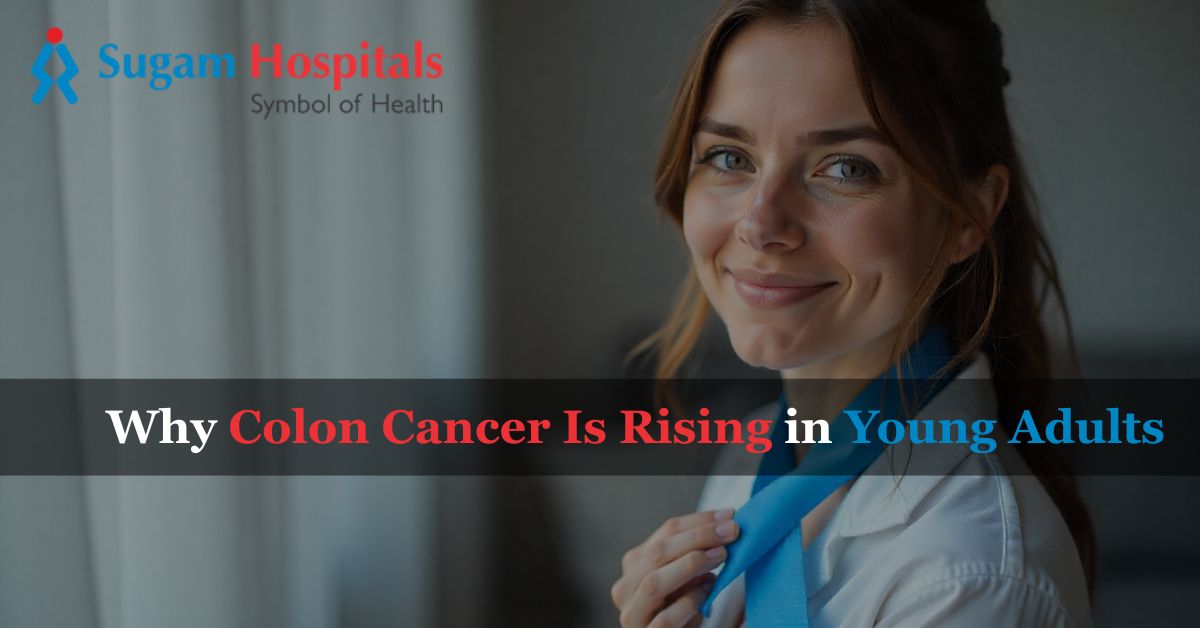Why Colon Cancer Is Rising in Young Adults

Why Colon Cancer Is Rising in Young Adults
September 1, 2025 by adminColon cancer (also referred to as colorectal cancer) has historically been associated with older people. For many decades, the medical establishment has issued guidelines that focused on screening adults over the age of 50, with the assumption that younger populations were at minimal risk.
Recent studies, however, have shown a concerning trend. The incidence of colon cancer in young adults, under the age of 50, is slowly increasing. The trend has caused concern among medical providers, and there is an urgent need for awareness, early detection, and lifestyle changes.
Understanding what is driving this increase can help ignite young adults to take action for their health.
Shifting Demographics and Alarming Statistics
Colorectal cancer rates in adults over the age of 50 have improved due to effective screening and prevention efforts. However, colorectal cancer incidence in younger adults is increasing as they are being diagnosed with colorectal cancer at alarming rates.
Nearly 10% of the cases of colorectal cancer are diagnosed in individuals younger than 50. Some countries have witnessed a rate increase of nearly doubling in the past two decades amongst this younger population. Researchers have begun to study it, so they can identify the components of the increasing number of colorectal cancer cases in younger adults, including lifestyle, genetic risk factors, exposure to environmental factors, and gut microbiota shifts.
Lifestyle Factors That Increase Risk
Everyday life choices affect colorectal health. High consumption of processed foods, red meats, and sugar-rich beverages leads to chronic inflammation, obesity, and metabolic diseases; all of which increase the chances of developing colon cancer. Combined with a sedentary lifestyle featuring low levels of physical activity, these are all serious risks. It’s well known that obesity, especially abdominal fat, can cause hormonal and inflammatory changes in the body that may increase tumor promotion.
Moderate alcohol consumption and smoking, the leading cause of cancer, have also been attributed to a modest increase in colorectal cancer. Clearly, while not everybody who lives with these habits will develop colorectal cancer, they are factors that can accumulate over time, especially in younger people who might not know they are at risk.
Genetics and Family History
Genetic predisposition is another important consideration. There are inherited syndromes, for example Lynch syndrome or familial adenomatous polyposis (FAP), that can significantly increase the risk of colon cancer, especially for younger individuals.
A family history of colorectal cancer also means you are at increased risk of development at a young age. For young adults who have these risk factors, genetic counseling and earlier screening guidelines can be life-saving. Even in the absence of any known family history, genetics can change abruptly, reinforcing the need for exit strategy.
Delayed Diagnosis in Younger Adults
A significant barrier to addressing colon cancer in young adults is a delay in diagnosis. Symptoms of colon cancer such as persistent abdominal discomfort, changes to bowel habits, unexplained weight loss, blood in the stool, and fatigue may be mistaken for less serious, more benign gastrointestinal issues.
Many young adults may delay seeing a doctor, convinced that because they are young, they cannot have cancer. This delay gives time for tumors to grow undetected, which can lead to a diagnosis occurring at a more advanced stage. Increasing awareness about these warning signs is essential because early detection is a major factor in treatment success.
The Importance of Medical Guidance
Even when managing one’s lifestyle, it is important to have professionals involved in a person’s care. Consulting with health care providers early can identify appropriate screening, timely diagnosis and specialty treatment.
Young adults should not ignore prolonged gastrointestinal symptoms that they ignore as minor or fleeting circumstances. When caught early, colon cancer is much more easily treated. Advanced therapies today have improved the benefits of treatment. For example, qualifiers for minimally invasive surgery have expanded, as well as targeted therapies and immunotherapies.
The increasing rates of colon in the young adult populations is an area of public health concern that requires more awareness and cautionary changes in lifestyles and treatment approaches. Young adults can begin their path to prevention and treatment by knowing the risks, being alert to early indicators, and getting to their doctors as early as possible.
Consulting the Best Oncologists In Chennai will help you with early assessment, accurate diagnosis, and provide you with the care that is best suited to your needs, and a comprehensive service designed to promote the best possible outcomes and long-term health.

